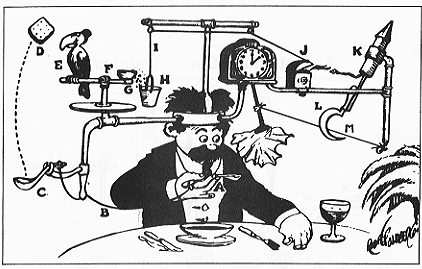
Last week, I wrote about a new eating routine that I began in light of new information about something called the “glymphatic system.” I didn’t mention that, in addition to making my sleep more restful, making this one improvement triggered a number of other positive changes as well. Today, I want to use that experience to highlight a phenomenon I’ve come to call the cascade effect.
The cascade effect is when making one positive change causes many, often unrelated, good things to happen downstream. For example, when people start exercising, they not only become healthier, but also become happier, smarter, and better at focusing,1 which means they’ll perform better at work.2 They also develop stronger willpower3 and better executive function,4 which means they’ll be more likely to make other good choices. A cascade of benefits flows from a single change in behavior.
There are a number of possible explanations for this, but my favorite is the concept of willpower virtuous cycles: Using willpower to execute a healthy behavior simultaneously strengthens your willpower muscles, improves brain health, and enhances your willpower identity, which makes it easier to use willpower for other things in the future. When a willpower-demanding behavior provides a great return on investment like this, it’s likely to trigger the cascade effect.
In addition, you’ll often find that your routines are interconnected in ways that aren’t readily obvious. Making a change in one area of your life can have a surprising impact on seemingly unrelated areas. Perhaps you start a meditation habit and then find yourself putting more money away into savings. Or maybe you adopt gratitude journaling and then find yourself eating healthier. The more often you do your future selves favors, the more you’ll feel – and act – like the kind of person who does what’s best yourself in the long run.
So, back to my eating routine. I switched from eating a large meal, late at night, to eating all my meals earlier in the day so that there would be several hours between my last meal and bedtime. I did this because it supposedly makes the brain clean-up process that happens during sleep more effective.5 While I do believe that’s working, changing my meal-times also triggered a cascade of other benefits I did not foresee.
First, I’m getting leaner. I think this is because less of my dinner is being stored as fat. Because I don’t go straight to bed after eating, I’m up, active, and burning the calories I just ate.
Second, I’m on a more consistent sleep schedule. It used to be the case that, no matter what time I got home – anywhere from 9pm to midnight – I would eat dinner at that time. So even if I got home after my bedtime, I would stay up and eat, pushing my bedtime even later. Sleep shift – the amount of time your daily sleep schedule varies – is associated with similar effects as sleep deprivation: The greater your sleep shift, the more cognitively impaired you’ll be, even if you got enough total hours.6 My old routine had me varying my sleep schedule by over three hours during the course of a normal week. My new routine has that variability closer to one hour.
Third, I’m spending less time watching television at night. My old routine was to eat dinner in front of my computer while watching a show. Now, since I’ve already eaten dinner, I often find myself skipping the screentime after work and, instead, listening to podcasts, stretching, or reading. Even though I use f.lux and these awesome orange glasses when I’m on my computer at night, I still think skipping screentime entirely is better for me. It’s likely helping me go to bed earlier and sleep more deeply.7 Plus, I’m reading more.
Fourth, I’m finding that I need a little less sleep. I’m waking up a few minutes before my alarm, and feeling less compelled to chug a cup of coffee straight away. This may be because, with an improved glymphatic flush each night, my brain is getting the restoration it needs in less time. It may also be because of the reduced screentime and more consistent sleep schedule. Whatever the cause, I’m finding myself with a little more time in the mornings to be productive, which usually means more time for writing. However, I’m not suggesting you use this technique as justification for shorting yourself on sleep. If you frequently get less than six or seven hours of sleep, you double your risk of cancer.7
Speaking of productivity, I’m feeling sharper and more focused during the day. I feel like I have more willpower because I’m handling difficulties better and having an easier time making healthy choices. This outcome is probably the most important because it means I’m now more likely to make other choices that could trigger cascade effects of their own.
It’s important to note, however, that the cascade effect also applies to the bad choices we sometimes make. Most adults are familiar with the unhappy chain reaction that results from the seemingly benign decision to have a few extra drinks on a Friday night: poor sleep, a hangover, skipping your workout, getting fewer of your Saturday chores done, feeling more stressed on Sunday, etc. So remembering the cascade effect can not only help you feel more motivated to do things that are good for you, but it can also make you feel less motivated to do things that are bad for you.
The most powerful version of the cascade effect is when you change one of your “keystone habits” – the fundamental, critical habits that have a wide-ranging impact on your quality of life.8 For example, if you’re someone who never works out, then exercise could be a keystone good habit for you to implement: It will improve your health, happiness, and self-esteem, while simultaneously triggering a cascade of other positive effects, as discussed above. A similar deluge of benefits will come from quitting a keystone bad habit. When I quit using drugs, my depression evaporated, my sense of self-efficacy skyrocketed, and both my productivity and my creativity increased dramatically.
Experiencing the cascade effect has made me realize that my life is a little like a Rube Goldberg machine: All the parts are interconnected, and changing one thing can affect many others.

This means that when it seems like everything is going wrong, having everything go better could be easier than it appears. Small changes can sometimes have a surprising amount of leverage, so if tackling the big, scary thing you feel like you need to change seems impossible, start with the low-hanging fruit. If you do that often enough, there’s a good chance the cascade effect will create some positive momentum in your life that makes harder changes not just easier, but borderline inevitable.
1 Ratey, John J., M.D. Spark: The Revolutionary New Science of Exercise and the Brain. Little, Brown & Company, 2008.
2 Achor, Shawn. The Happiness Advantage: The Seven Principles of Positive Psychology That Fuel Success and Performance at Work. Crown Business, 2010.
3 Halvorson, Heidi Grant. Succeed: How We Can Reach Our Goals. Plume, 2011.
4 Reynolds, Jennifer Lea. “Can Sports Help Kids Manage Their ADHD Symptoms?” US News & World Report. July 31, 2017. https://health.usnews.com/health-care/patient-advice/articles/2017-07-31/can-sports-help-kids-manage-their-adhd-symptoms.
5 Gundry, Steven R., MD. The Longevity Paradox: How to Die Young at a Ripe Old Age. Harper Wave 2019.
6 Bronson, Po and Ashley Merryman. NurtureShock: New Thinking About Children. Twelve, 2011.
7 Walker, Matthew, PhD. Why We Sleep: Unlocking the Power of Sleep and Dreams. Scribner, 2018.
8 Duhigg, Charles. The Power of Habit: Why We Do What We Do in Life and Business. Random House Trade Paperbacks, 2014.
